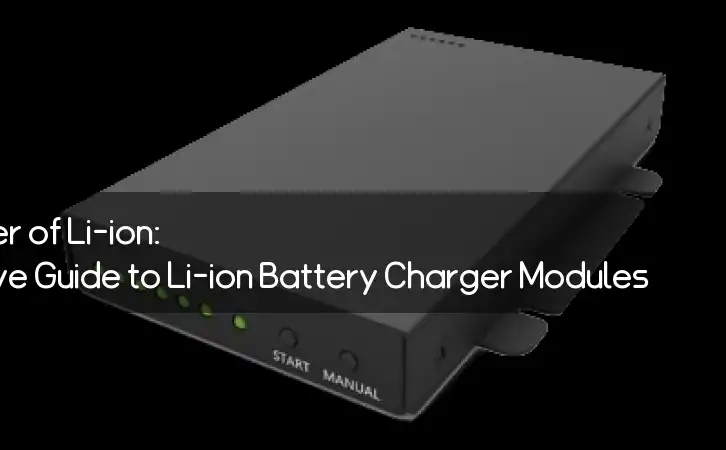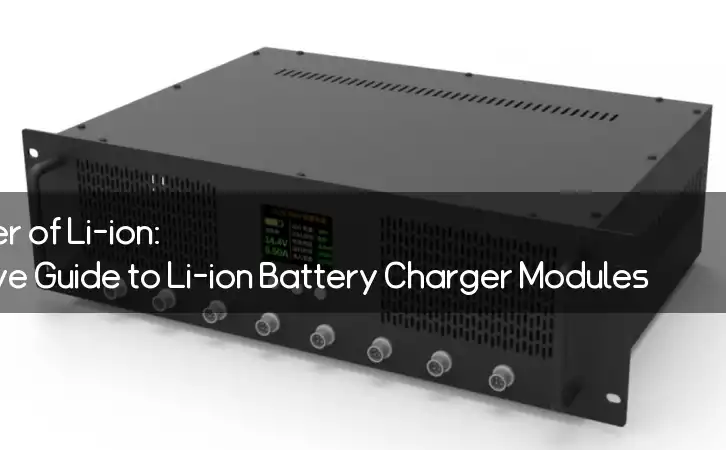Information Center
Unlocking the Power of Li-ion: A Comprehensive Guide to Li-ion Battery Charger Modules
Published:2023-04-10 18:11:29 Author:Green WCND Views:77Li-ion Battery Charger Module: An Overview

Lithium-ion (Li-ion) batteries have become extremely popular in recent years due to their high energy density, low self-discharge rate, and long cycle life. They are used in a wide range of applications, from portable electronic devices to electric vehicles. To charge Li-ion batteries safely and efficiently, specialized Li-ion battery charger modules are required.

A Li-ion battery charger module is an electronic device that controls the charging process of a Li-ion battery. The main function of a Li-ion battery charger module is to convert the AC power from a wall outlet to the DC power required by the battery, while regulating the voltage and current to ensure safe and efficient charging.
There are two main types of Li-ion battery charger modules: linear and switching. Linear charger modules are simple and relatively inexpensive, but they waste a lot of energy as heat, making them less efficient. Switching charger modules, on the other hand, use advanced electronics to reduce energy loss and achieve much higher efficiency.
Another important factor to consider when choosing a Li-ion battery charger module is the charging algorithm. The charging algorithm is the set of instructions that determines how the charger module will charge the battery. There are many different charging algorithms, but the most commonly used ones are constant current/constant voltage (CC/CV) and pulse charging.
CC/CV charging is the most widely used charging algorithm for Li-ion batteries, and it consists of two stages. In the first stage, the charger provides a constant current to the battery until it reaches a predetermined voltage level. In the second stage, the charger switches to constant voltage mode, where the voltage is held constant while the current decreases until the battery is fully charged.
Pulse charging is a newer charging algorithm that has gained popularity in recent years. It uses short voltage pulses to charge the battery, followed by periods of rest to allow the battery to recover. This method is more efficient and can help extend the life of the battery.
In addition to the charging algorithm, Li-ion battery charger modules may also have features such as overcharge protection, overheat protection, and short circuit protection. Overcharge protection prevents the battery from being charged beyond its safe limit, while overheat protection shuts down the charger if it detects that the battery or the charger itself is getting too hot. Short circuit protection prevents damage to the battery or charger if a short circuit occurs in the charging circuit.
Li-ion battery charger modules are essential components for charging Li-ion batteries safely and efficiently. They come in a variety of types and with different features, making it important to choose the right one for your particular application. Whether you are designing a portable electronic device or an electric vehicle, the right Li-ion battery charger module can help you get the most out of your battery and ensure its long-term reliability.
Power Adapter Design and Customization Guide for Portable Electric KettlesI. Common Design Types for Portable Electric Kettle Power AdaptersPortable electric ke···
I. Common Design Types of Power Adapters External Independent Type (Most Common) Design: A standalone adapter (e.g., "black brick") connected to the p···
Handheld Vacuum Cleaner Power Adapter Selection GuideIntroductionHandheld vacuum cleaners have become a mainstream tool for household cleaning due to their port···
Drill Power Adapter Selection Guide.drill-container { font-family: Arial, sans-serif; line-height: 1.6; max-width: 800px; margin: 0 auto; padding: 20px; } .dril···





